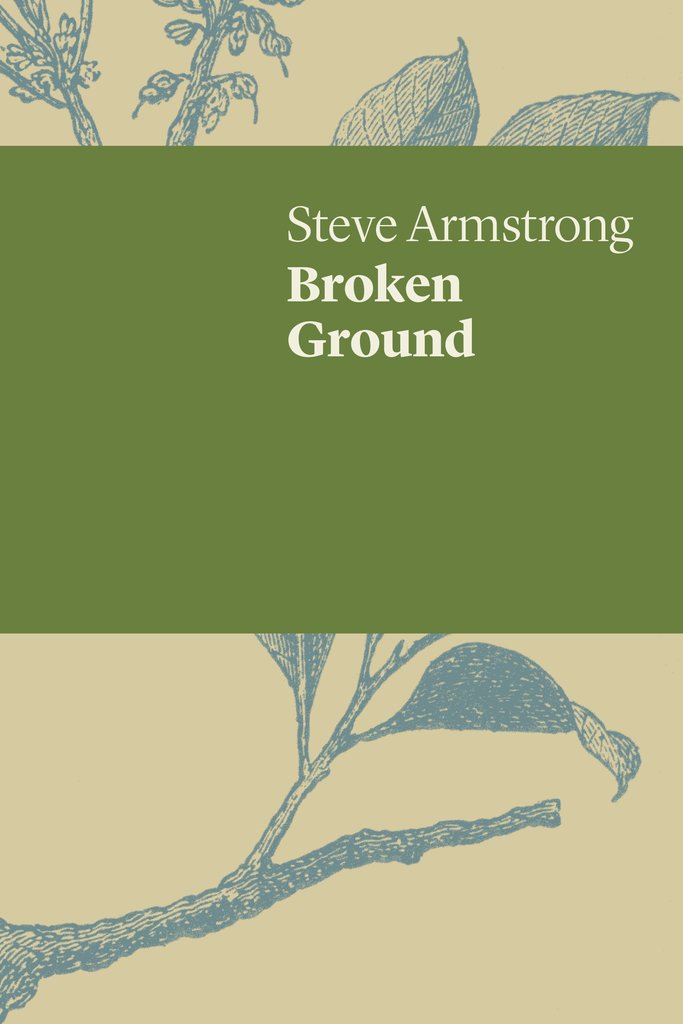
Broken Ground by Steve Armstrong
UWAP, 2018
Steve Armstrong’s Broken Ground is an extended walking meditation cleverly disguised as a book of poetry. Inside this collection resides a determined drive towards immersion and a deliberate movement beyond text, into a numinous, continuous cadence: a secret rhythm of stride known only to those who would seek to map out earth and sky.
At times, in review, it feels like a Sisyphean task to gather together the fragmented rhythms, thick with the natural world, with love story and family history and, above all, reverberating with the connotations of contingency. My natural yearning is to let the work’s pulse nestle quietly down inside the mind. Or perhaps that pulse would find itself lodged in the gut, for Armstrong’s poems are so very embodied and at home in and of themselves; so self-aware that the already excavated ground seems to require no further diviner.
Broken Ground explores a very specific poetry of time and place. From the first poem, ‘Black and White,’ we receive glimpses of the bedrock that the subsequent poems will continue to excavate. Here, landscape takes on a more than general significance – specific places are invoked by naming, and the tenor is that of memoir, nostalgia and a belonging in time:
A photograph, a fading Kodak of a boy. On the back in my mother’s hand – Turramurra Bush, 1965
Themes of family, and of finding a significant place – perhaps home – in the greater Hawksbury are paramount here:
My substrate is rocks and trees, and there’s a prehensile ache at the sight of a branch that leans across a cerulean Sydney sky. Here is the ground of a well-weighted line.
The key to Broken Ground is this transference of meaning, outwards from the landscape and into the body. Armstrong’s poems divine truth from the wandered -through world, as explored in ‘On the Delta’:
Later remember not this place, and the way water mirrors trees and sky, but what it is that you’ve found instead – this solid thing that’s light within you – let it wing into the regions of wider sight, and feel for the company of words. Go on recalling the seamless flow over mud if you must, then claim what’s yours.
However, this is not the collection’s ultimate tendency. Instead, Armstrong offers a boon in return for the composition of these poems. An interior geography of human connections and disconnections – from mother, father, lovers, children and elders – somehow seeps out from the poet to enter the exterior landscape. We see this collaboration in the collection’s titular and final poem, ‘Up and Down a Dry Lake,’ where country is seen to be:
too dry out here for tears at my coming up short, for the words that won’t land. A lake two-hundred meters deep with silt. Long accumulation chokes in the throat like grief, nonetheless a small figure standing in the middle I’ll speak for what inheres, lay down on dried mud and tufted grass; be baptised by dirt and re-membered by earth.
This exchange between landscape and the walking body-in-landscape is also explored in ‘Dreams and Imitations’:
Your step is the step of a younger you, or perhaps the ground presses back and offers to lighten your load a little. You falter unused to such reception, and yet the rhythm you settle on is both your whole being and your nothingness.
Broken Ground does not merely offer a poetry of nature-based lyric philosophy in the manner of a Lake Poet. As the collection progresses, Armstrong’s drive is to participate, to partake of what is offered. Ritual pervades the poems: longing is somehow danced out into the landscape.













